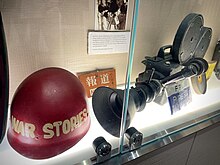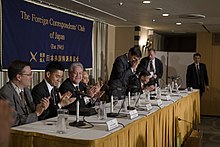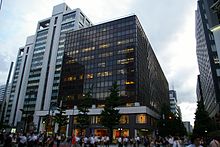Foreign Correspondents' Club of Japan
日本外国特派員協会 (にほんがいこくとくはいんきょうかい) Nihon Gaikoku Tokuhain Kyokai | |
 | |
| Abbreviation | FCCJ |
|---|---|
| Formation | September 1945 |
| Type | 公益社団法人 Koeki Shadan Hojin (public-interest incorporated association) |
| Headquarters | Marunouchi Nijubashi Building 5F, 3-2-3 Marunouchi, Chiyoda-ku, Tokyo 100-0005 |
| Location | |
| Coordinates | 35°40′48″N 139°45′43″E / 35.6800317780329°N 139.7620650848573°E |
Membership | 2,000 |
| Website | www |
Formerly called | The Tokyo Correspondents Club |
The Foreign Correspondents' Club of Japan (FCCJ) established in 1945 to provide support to foreign journalists working in Post-World War II Japan[1] has historically been situated in the vicinity of Ginza, Tokyo.
Today, the club offers a workroom facility, a library, a restaurant, a bar, and a steady stream of local and international speakers and panels, for its members. Its facilities are housed on the 5th and 6th floors of the Marunouchi Nijubashi Building near the Imperial Palace.
FCCJ publishes the monthly No. 1 Shimbun.[2]
Presidents[edit]
Past presidents[3] include legendary war correspondent John Rich, leading "China watcher" John Roderick, later editor of the Chicago Sun-Times Frank Devine, 1951 Pulitzer Prize winner Max Desfor, and Burton Crane, also well known as a singer for Columbia Records, singing Japanese-language versions of popular Westerns songs of the day, becoming known as the "Bing Crosby of Japan".[4]
Membership[edit]
Club membership is around 1,450, with over 240 foreign correspondents (and their Japanese counterparts) as well as over 160 professional associates, mostly working for local media. Associate members number around 1,050 and include entrepreneurs, business executives, other professionals as well as authors and artists.[5]
Association[edit]
The FCCJ is not a member of the International Association of Press Clubs but has reciprocal agreements with a number of Foreign Correspondents' Clubs in Asia and North America:[6]
- Foreign Correspondents' Club of Beijing
- Foreign Correspondents' Club, Hong Kong
- Seoul Foreign Correspondents’ Club
- Foreign Correspondents' Club of Thailand
- Singapore Press Club
- Colombo Swimming Club
- Hanoi Press Club
- The Foreign Correspondents' Club of South Asia
- Jaisal Club
- Overseas Press Club of America
- Omaha Press Club
- International Press Club of Chicago
- The National Press Club
- National Press Club of Canada
See also[edit]
References[edit]
- ^ [1] History of the club 1945-1998. Charles Pomeroy, General Editor
- ^ "Publications | FCCJ: The Foreign Correspondents' Club of Japan". Archived from the original on 2010-01-07. Retrieved 2009-12-16.
- ^ "FCCJ - Past Presidents". www.fccj.or.jp. Archived from the original on 2017-04-08. Retrieved 2015-06-29.
- ^ To Tell the Truth, 20 March 1961
- ^ Official data provided by the Foreign Correspondents' Club of Japan. Last updated February 2024.
- ^ "FCCJ - Reciprocal Clubs". www.fccj.or.jp.
External links[edit]
- FCCJ Home Page
- FCCJ History Archived 2013-11-06 at the Wayback Machine





